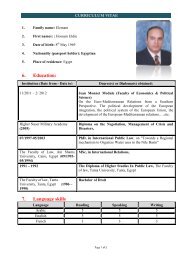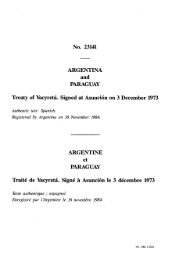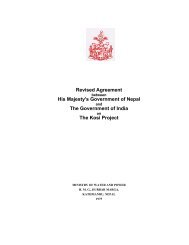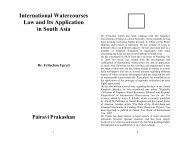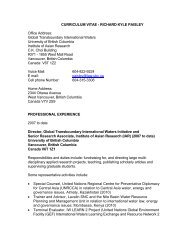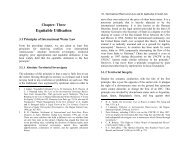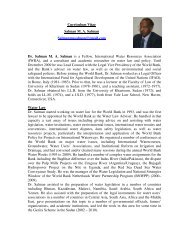288 / <strong>International</strong> <strong>Watercourses</strong> <strong>Law</strong> <strong>and</strong> <strong>Its</strong> <strong>Application</strong> in South Asia Conclusions <strong>and</strong> Recummendations / 289forever, only if their interests were accommodated in such agr<strong>and</strong>iose enterprise.6.5 Implications <strong>and</strong> Future ResearchIn this section, I will consider the implications of this study forfuture scholarship in two areas, poverty reduction <strong>and</strong> the MDG.Efforts of the international community were initiated in 1972 inStockholm, further strengthened in Rio de Janeiro through theEarth Summit in 1992, <strong>and</strong> WSSD, signifying the importanceof freshwater not as a separate issue but as an integrated part ofthe whole environment, <strong>and</strong> the commitment of the world toit. 38The issue of water is explicitly related to the human rights ofpeople, without which life cannot be imagined. 39 These rightsare safeguarded by the provisions of Article 10 of the 1997UNCIW, stating that priority will be provided for “vital humanneeds.” 40 Moreover, the development of renewable energy forreducing global warming is on the agenda for the internationalcommunity. 41 MDG’s <strong>and</strong> the recent WSSD have set a target ofhalving the number of people presently deprived of potablewater, proper sanitation <strong>and</strong> clean energy from two billion toone billon by the year 2015. In context of the statement that38 D. Harrison, “America bows to summit dem<strong>and</strong> on sanitation for theworld’s poor” The Daily Telegraph, 3 p. 4, September 2002. The UK’sEnvironment Secretary Margaret Beckett is quoted as saying that theWSSD has been largely successful <strong>and</strong> illustrated the significance of‘multilaterism’.39 S. McCaffrey, “A Human Right to Water: Domestic <strong>and</strong> <strong>International</strong>Implications” (1992) 5 GIELR, pp. 1-23.40 UNCIW, 36 ILM (1997), p. 722.41 J. Vidal & P. Brown, “Meeting was sell out” The Guardian, 4September 2002, pp. 1-3, 2002. It is massive blow for the renewableenergy plan. Main achievements were setting the target of halving thenumber without basic sanitation <strong>and</strong> drinking water by 2015, <strong>and</strong> alsohalving the 1.2 billion who live on less than $1 a day.hydropower as a source of clean energy will be encouraged,unfortunately, no timetable is provided. 42 As maintained byGerhard Schroder, the German Chancellor, global warming isno longer a matter for scepticism, it has become a reality. Hefurther argues that there can be no global security without anagenda for global equity <strong>and</strong> that developing countries requirethe co-operation of developed nations to carry out ambitiousenergy projects. 43To eliminate poverty in the least developed <strong>and</strong> geographicallyh<strong>and</strong>icapped nations, the international community shouldchange existing policies <strong>and</strong> programmes so as to providespecial treatment <strong>and</strong> concessions on investment, trade,environmental obligations <strong>and</strong> financial assistance. Poverty hasbeen identified as a cause of civil war <strong>and</strong> terrorism, <strong>and</strong> is ageneral hindrance to world peace <strong>and</strong> prosperity. For example,in Nepal the seven year Maoist insurgency has led to the deathsof over 9,000 people <strong>and</strong> the loss of billions of rupees worth ofproperty. 44 Thabo Mbaki, the South African President, hasrightly suggested at the (WSSD) in Johannesburg) that until thegap between the haves <strong>and</strong> have-nots is filled, the fuelling ofglobal terrorism will continue. 45 World poverty including thatof south Asia must be eradicated by utilising these immensewater resources. In this effort, the rich states must favour theweaker states in order to eradicate the hardship of poverty,pursuant to the notion of equity. In the context of India <strong>and</strong>42 P. Brown & J. Vidal, “Summiteers plant their flags in the foot hills.” p.13, The Guardian, 4 September 2002.43 P. Brown, “The US must play its part” p. 18, The Guardian August 30,2002.44 On human rights implications of Nepal see “Human Rights <strong>and</strong>Security” (14 February 2000) at www.amnesty.org.45 P. Brown & J. Vidal, ‘End seas of poverty’, The Guardian, 27 August2002, p. 3. John Pronk, Envoy of UN Secretary General to the WSSDis quoted as saying that the poverty of developing countries should beaddressed by the help of developed states.
290 / <strong>International</strong> <strong>Watercourses</strong> <strong>Law</strong> <strong>and</strong> <strong>Its</strong> <strong>Application</strong> in South Asia Conclusions <strong>and</strong> Recummendations / 291Nepal, the former, being better off than the latter, should givepriority to the development of it less developed neighbour,Nepal. This is also a finding of this research. A world ordercharacterised by equitable development <strong>and</strong> provision ofservices to the people of developing nations like those enjoyedby the people of the developed nations is indispensable tokeeping the peace, harmony, <strong>and</strong> welfare of this planet. Povertyhas been blamed for the Maoist uprising. Similar problemsexist across other parts of south Asia. Thus, in order toestablish an equitable society in these countries, broadening thescope of the MDG’s, is urgently required. The issue of cleanenergy such as hydro-energy <strong>and</strong> the supply of potable water<strong>and</strong> sanitation service are linked with the freshwater issue.Nepal requires cooperation without conditions (imposed asriparian consent) from western governments <strong>and</strong> multilateralinstitutions. These issues require further research. The otherimpediment for Nepal, regarding the utilisation of its resources,is the lack of its ability to generate power at competitiveprices. 46 The private sector should be encouraged tosupplement the public sector so that cheap energy generation<strong>and</strong> competitive marketing can be undertaken. 47 Enhancedtechnology, competitive energy prices (as required <strong>and</strong> set bythe market) <strong>and</strong> maximisation of efficiency are essential toensure competitiveness. Alternative markets such as China <strong>and</strong>Bangladesh need to be explored so that India is not the solemarket. The provision of modern technology to provide quick<strong>and</strong> dependable energy is related to the water resourcesavailable in south Asia.This study shows that application of the principle of equity <strong>and</strong>the rule of ‘reasonable <strong>and</strong> equitable utilisation’ will helpunravel the intricate <strong>and</strong> complex problems associated with theharnessing <strong>and</strong> sharing of Himalayan waters. As stated inChapter three, the principle of equity has the ability to reconcileinterests of all states by considering socio-economic <strong>and</strong> otherrelevant factors. The norms associated with it will helpmaximise the benefits to all the nations concerned. Such amindset on the part of the regional <strong>and</strong> sub-regional partnerswould ensure justice <strong>and</strong> prosperity for not only Nepal but thewhole of south Asia.•46 Supra note 28, p. 30: Government-developed hydropower in Nepal hascost an average of $ 2800/kw while private generation costs are$ 1000/kw; see S. Rana, “Don’t Blame Private Power Producers” in(2002) September, 111 Nepali Times; also see M. Pradhan & S. B. Pun,“Private Sector Participation in the Power Sector LessonLearnt/Unlearnt so far” 14-20 (2003) February, in 22 Spotlight, p. 5.;also note “Chilime begins production” in The Kathm<strong>and</strong>u Post 26August 2003.47 S. B. Pun, “The Evolving Role of Public <strong>and</strong> Private Institutions in theNepalese Power Sector” in (1999) WECS Annual Report, pp. 38-49.



